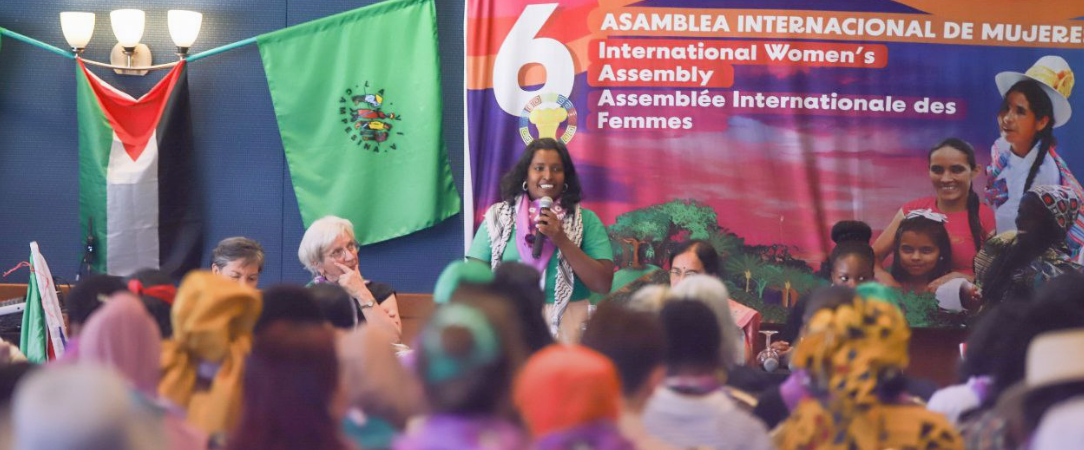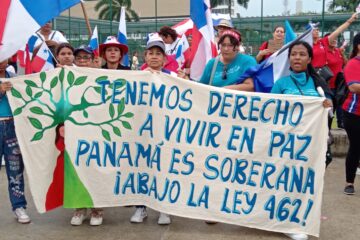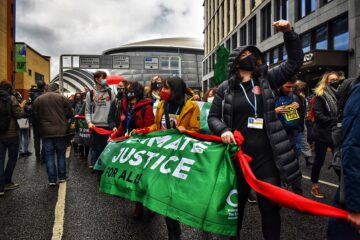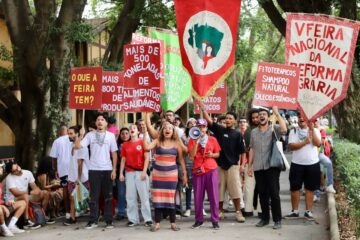The 6th Women’s Assembly was one of the first spaces of the 8th International Conference of La Via Campesina (LVC). It was a moment of reunion: the first assembly and the first conference held since the pandemic. The assembly took place on December 2nd, a day after the Youth Assembly, which opened the Conference, and on the same day of two other spaces that were held for the first time: the space for men against patriarchy and the Sexual Diversity Assembly, which are also consequences of feminist building within La Via Campesina.
During the mística that opened the assembly, women walked into the room holding the flags of their movements, showing the power of the connection between local and global struggles, as well as of the alliances between organizations. In the afternoon, another mística paid tribute to Nalu Faria, a World March of Women sister who passed away in October 2023, for her valuable contributions to feminism and La Via Campesina women’s self-organizing efforts.
30 Years of La Via Campesina
While women took part in the establishment and building of La Via Campesina in different terrritories and international spaces, a collective struggle was necessary to get space and exposure, as well as to push feminism as a struggle that cannot be separated from the peasant struggle and the struggles of the peoples of the world. This history was discussed in the first panel of the Assembly, called “30 years of LVC: what are women’s contributions to the process and how can we continue to move forward?” with Nettie Wiebe (National Farmers Union, Canada), Anuka de Silva (Movement for Land and Agricultural Reform, Sri Lanka), and Pancha Rodríguez (National Association of Rural and Indigenous Women of Chile).
“We care for the land and the soil. We are bringing more women who suffer in rural areas. Every region suffers differently and deeply because of capitalism.”
Anuka de Silva
Nettie addressed the history of women’s participation in La Via Campesina since its foundation. She recalled that, in 1993, the declaration of the launch of the organization did not mention women, and that in the conference held in Mexico in 1996, women were only 20-25 percent of the delegates. That moment, the International Committee was initially established with seven men. The all-male board was not well-received, because it did not represent La Via Campesina in the territories, where women have always been very important. The list was then discussed again, and that was how Nettie joined it, as the only woman in the committee. “My role was not only to be a regional coordinator, but to make women be heard and have a place in La Via Campesina as equals in the struggle. It was not a one-person work—it was the work of all of us,” she said.
The first women’s assembly was held in 2000, in the conference in Bangalore, India, where important things were defined, starting structural changes, like gender parity in coordinating boards. “That allowed us to better understand solidarity, for being inclusive,” Nettie argues, adding that “it’s a gift for La Via Campesina that we are all here.”
“We don’t have to apologize for anything or ask for permission or think that we are secondary. We are key to this movement. We bring lifeblood to this movement, as well as good analyses and political work in our communities and globally.”
Nettie Wiebe
The conversation about gender parity in the organization is part of the discussion about the sexual division of labor, which La Via Campesina women have been addressing in their spaces of action and reflection. “In most rural homes, it’s women’s labor that actually supports them, which is also unfair, because there should be parity: everyone should have the same responsibility around the house, men should recognize us but also work with us, taking care of the children and the crops, to actually build a world of solidarity,” Pancha argues.
Women’s Work Defending Land and Diversity
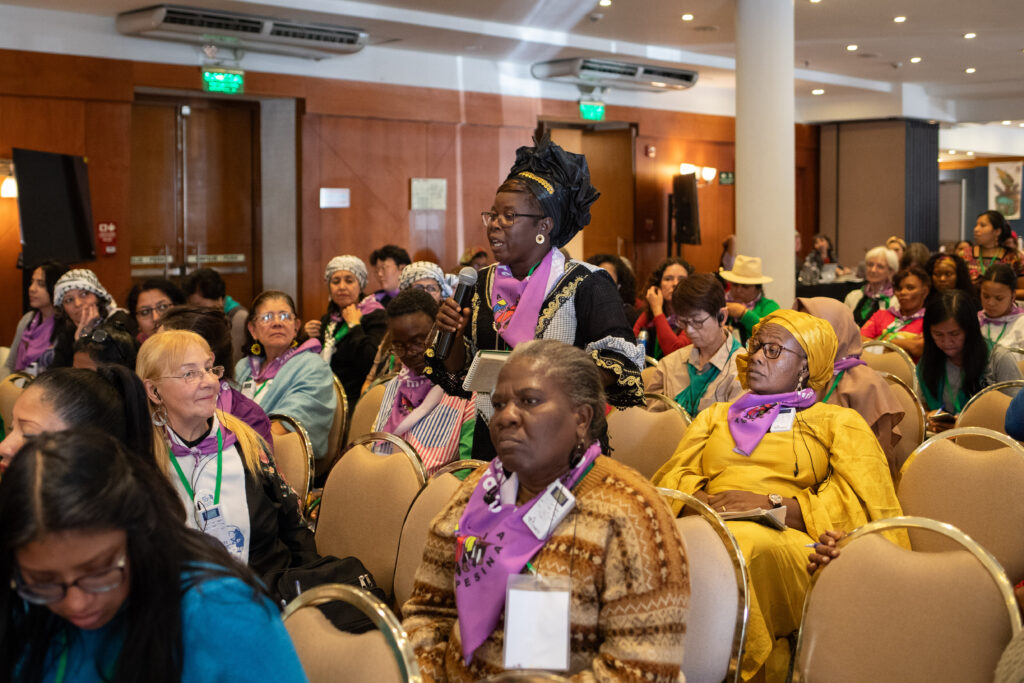
Women are responsible for several battles, alternatives, and processes defending bioversity, memory, and food sovereignty. “Food sovereignty has given us our identity back, because it comes from acknowledging women’s history, as they have discovered and cared for the seeds,” Pancha says, arguing that acknowledging women’s work is a fundamental step for popular peasant feminism.
The participants of the following panel, about LVC women’s presence and struggle in the international context, were Nury Martínez (National Federation of Agricultural Trade Unions, Colombia), Margaret Masudio (Eastern and Southern Africa Small-scale Farmers’ Forum, Uganda), Daya Laxmi (All Nepal Peasants’ Federation), Torkia Chaibi (Million Rural Women, Tunisia), and Maria Nayna (NordBruk, Switzerland). They spoke about different forms of regional resistence in face of capital advances over nature and rural communities. Land grabbing, free trade agreements, the rule of transnational corporations, climate crisis, forced migration, mining, hunger, war, contamination and privatization of water, and violence against women were some of the challenges they addressed. The answer to this global crisis necessarily includes women’s organization in building food sovereignty and reoganizing the economy to put life on center stage.
Afterwards, other sisters discussed LVC women’s strategies to build feminism and overcome violence, Yolanda Áreas (Association of Rural Workers, Nicaragua), Jeongyeol Kim (Korean Women Peasant’s Association, South Korea), Hortense Dolores (National Coordination of Farmers’ Organizations and Agricultural Producers of Congo), Isabel Villalba (Galician Peasant Union, Galicia) e Yildiz Temürtürkan (WMW Turkey). Yildiz spoke about the relevance of political alliances in strengthening common struggles and the mutual lessons learned between the WMW and the LVC.
The most important conflict today is the one between capital and life. We defend life, we sustain the world, we feed the world. Food sovereignty is a feminist effort because we, women, produce food, not only as farmers, but also as people who prepare the food and keep the seeds. This is at the heart of our alternative, which is feminist economy. Feminist economy puts life on center stage, not profit.
Yildiz Temürtürkan
The building of popular peasant feminism especially started from the initiative of the women of the Latin American Coordination of Rural Organizations (CLOC-La Via Campesina), as a challenge that becomes internationalized. Women with La Via Campesina from different continents incorporate this and make it deeper, developing a diverse feminism, with different expressions in each territory, context, and struggle.
The regional militants of La Via Campesina spoke about strategic organizing pillars, including education, based on popular education and the formulation of the history of peasant women. “We had to organize in groups to have some land to feed our children. Through education efforts, we started to demand the right to land, because we grow, we harvest, we feed our children and the peoples,” Hortese Dolores said about the reality on the African continent, the last one where La Via Campesina started to organize.
“It’s not possible to understand the meaning of popular peasant feminism without understanding the history of women from rural areas, water communities, and forests. Pursuing a pedagogical proposal to build popular peasant feminism is relevant because we aim to build unity in diversity.”
Yolanda Áreas
The Right To Land and to a Life Free From Violence
International campaigns are a striking way of waging the struggle in the history of La Via Campesina, and they have been relying on the major role women play. They are campaigns for the protection of native seeds, for peasant rights, against the WTO, and against patriarchal violence in the countryside. The latter is a permanent agenda that was very expressive during the assembly. Feminism is necessary to break women free from silence, as Hortense said.
“In our tradition, women don’t have the right to speak in front of men when they are talking. Women stay in the kitchen to feed men. This tradition has blocked us, as did religion. But women started to wake up, demand rights to be side by side with men. African women will break the silence. Now, if a woman is not on the land, there is no one to nurture it.”
Hortense Dolores
“Popular peasant feminism was born from the hands that are close friends of sowing, of beans, of wood burning stoves,” Isabel Villalba added. Finally, when asked the question “how to continue to build women’s spaces in the territories, regions, and across La Via Campesina?”, the participants of the assembly held a meeting with brief speeches, sharing local and regional experiences, concerns about the organization, and proposals for the collective. They also shared advances they see in the make up of the 8th Conference, with a massive turnout of women and several delegations with a majority of women.
The closing of the assembly included a session to read the final declaration, addressing La Via Campesina women’s goals for the future, based on the collective commitment of this self-organized international space, as well as the slogan “With conviction, we open the way to popular peasant feminism, we build food sovereignty, and we struggle against the crisis and violence.”
____

